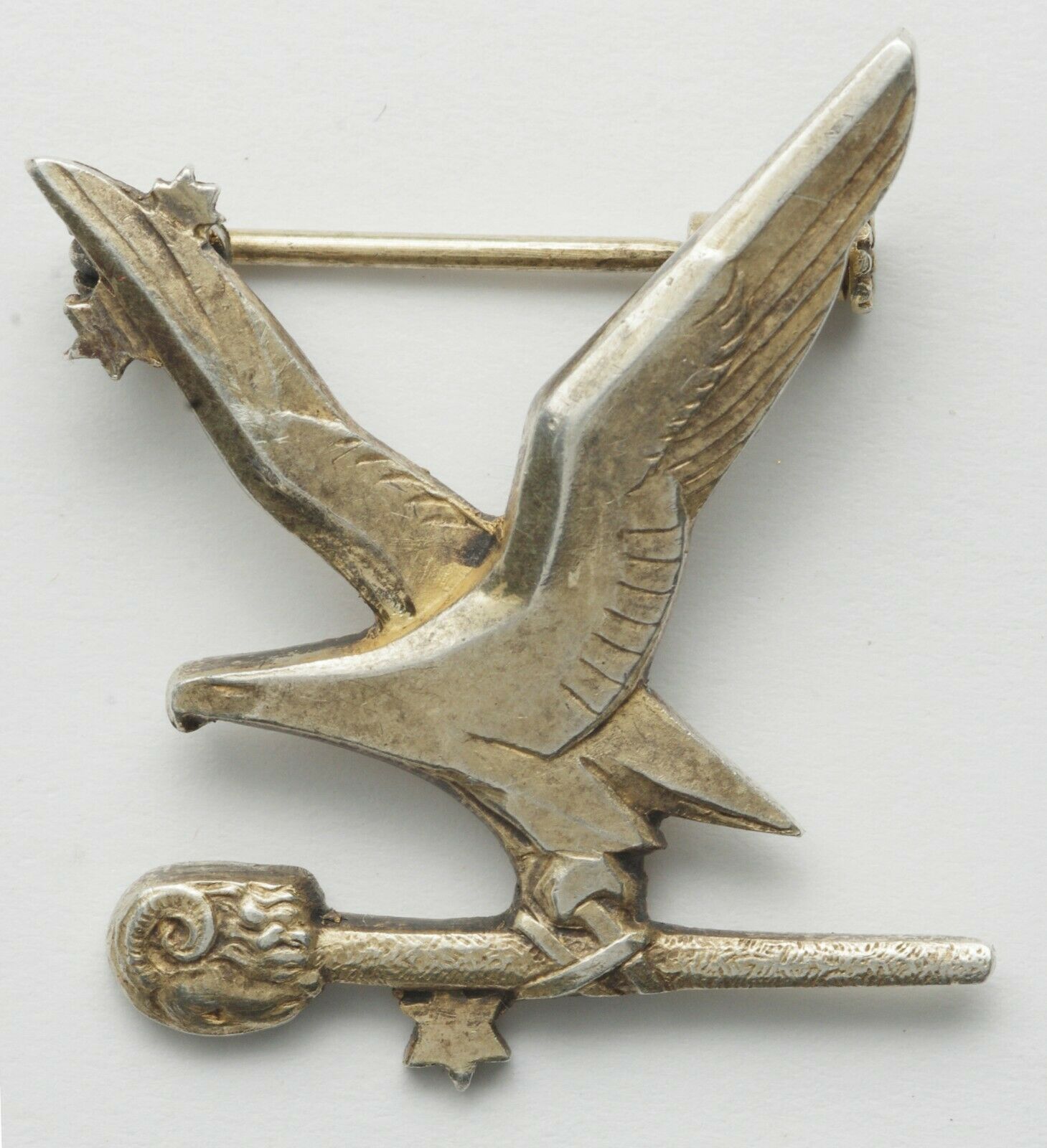-40%
RARE WWII Italy Aviation Badge AEROPLANI CAPRONI_Silver 800_ORIGINAL
$ 422.4
- Description
- Size Guide
Description
RARE WWII Italian Aviation"
AEROPLANI CAPRONI"
Badge_Silver 800_ORIGINAL
Original.
Not a modern fake!
Rare and beautifully made.
Silver Badge AEROPLANI CAPRONI.
Silver badge in the form of eagle spreading wings and holding stick with goat’s head in his claws, inscription "AEROPLANI CAPRONI" and silver hallmarks on the reverse.
Silver hallmark on the reverse is of the type used in
Fascist Italy
when it ruled by Mussolini and
was introduced in February 1934
. It has fascio sign (a bundle and an axe, the Fascists symbol; Fascist party actually got its name after it) in the middle. In 1943
Mussolini was deprived of power, and the
fascio sign was removed from Italian hallmarks in 1944.
This hallmark indicates that the badge was made and use when Fascist rule was in its heyday in Italy.
The badge represents the coat of arms of Caproni family. Gianni Caproni, a pioneer of Italian aviation
and
an aircraft designer and
manufacturer
who had designed and built the first Italian airplane in 1910 and remained the leading Italian aircraft manufacturer until after the WWII. He was given the title of Conti di Taliedo by King Vittorio Emanuele III, in recognition of his contribution to the aircraft development of the country and his support of the war industry during the WWI. The family
coat of arms and
motto “Senza cozzar dirocco” which may be translated as “Destroying without the hustle on the ground”(referring to the bombers that Caproni produced with considerable success) were suggested by famous Gabriele D'Annunzio, Italian poet, soldier, aviation enthusiast and prominent fighter pilot of WWI.
Gianni Caproni has contributed considerably to aircraft development. Early in 1914 he built the world’s first single-seat, tractor-engine fighter plane to be armed with a forward-firing machine gun. Once
Italy
entered World War I in May 1915, Caproni started developing and producing successful series of bombers, fighters and some giant aircraft. The actual warfare showed the virtues of Caproni planes, and they were ordered and used by Italian, French, British and US Air Forces.
By 1929, Caproni had designed the world’s largest bomber to date, the bi-plane tri-motor Caproni Ca.90.
Caproni
was famous for his unusual and odd designs, such as huge flying boat with nine pairs of wings, or “flying barrel” – experimental Caproni-Stipa airplane with propeller placed inside a huge tubular airfoil, a distant ancestor of modern Turbofan engine, and Caproni Campini N.1, experimental proto-jet fighter plane, the second in world history (first flight in 1940).
During WWII, as well as WWI,
Caproni
was the principal supplier of planes to Italian Royal Air Force. His planes dominated the sky in Abyssinian war. In 1943, when his factories found themselves in pro-German
Italian
Social
Republic
, he did not allow them and his workers to be moved to
Germany
. After the end of the war he was accused in collaboration with the Fascists and had to conceal himself till 1946 when he was cleared of the accusation by the court.
Post-war Italian Government preferred to order aircraft from abroad, primarily from
USA
. It led to fast decline of
Caproni’s business. He looked for support everywhere, and when he met Harry Truman, the President of the
US
, he was surprised to see big photograph of himself at the wall of President’s cabinet beside the photo of famous aviator Wright. Truman said the photo was placed there by President Roosevelt in honor of Caproni’s contribution to world aviation, and he decided to leave it. However, Caproni could not improve his business situation, and his company ceased operation in 1950.
The photographs of Caproni and his planes are for illustration purposes only and are not included in the lot.
Photographs (
for illustration purposes only)
- Caproni family coat of arms and motto “Senza cozzar dirocco” by Gabriele D'Annunzio
- Gianni Caproni
- Gianni Caproni while personally testing a Caproni Ca.5 in 1911
- Caproni Ca.90
- Caproni-Stipa
- Caproni Campini N.1
- Group of military officers and Giovanni Caproni(at centre)
pilot badge wings




















